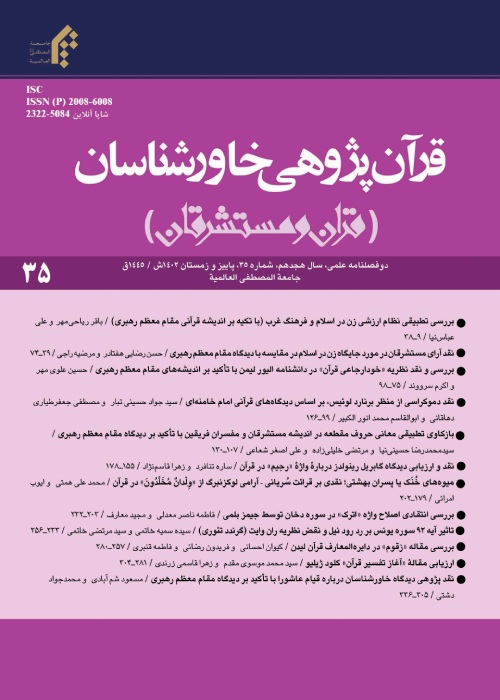Evaluating John Wansbrough's views on Qur'anic traditions
According to Wansbrough, the framework of revelation contains a number of traditions that have been used in three forms which are intuitive (badahati), investigative (istifsari) and narrative (naqli) in order to introduce the main monotheistic themes of the Qur'an and are composed of a relatively limited area of unrelated words and passages. Since Wansbrough has studied with the method of literary analysis, this article also uses the same method to explain and evaluate his hypothesis in these three forms: First, the intuitional form: in the two keywords "Qul" [Say] and "Ya Ayyuha" ['O]: In order to assess the correctness of this form, the possibility of attributing or substituting human's word (especially prophetic speech) with the words of God and the connection between " 'O Bani Adam" sons of Adam and "Ibn Adam" son of Adam, is discussed. Second, the investigative of, Inquiry: in keywords such as "Rabbi" My Lord, Rabbana" our Lord; “Allahoma" O Allah, "Praise be to Allaah, praise be to Him, Praise be to your Lord, and Praise be to you and … or Glory be to God, Glory be to Who, Glory be to your Lord, Glory be to you and… and the emphasis of "Aya". To evaluate this form, keywords are examined and a comparison is made between Islamic rituals and ignorant practices. Because Wensbrough considers pre-Islamic acts of worship as a source of Qur'anic allusions in this form and believes that Islamic rituals such as "Tawaf", "Woqof", "Sacrifice" and "Hajj" are from the covenant between God and Abraham and Ishmael (AS) was taken in Mecca and it has been mixed with some foreign and distorted customs. Third, the narrative form: To examine this form, Wensbrough's claims about the stories and the comparison between the stories of the Qur'an and the holy books are evaluated; because he sees this form as a collection of stories that are retellings without reconstructing the stories of the Testament and have achieved some form of structural integration with the help of a limited number of rhetorical rules.
- حق عضویت دریافتی صرف حمایت از نشریات عضو و نگهداری، تکمیل و توسعه مگیران میشود.
- پرداخت حق اشتراک و دانلود مقالات اجازه بازنشر آن در سایر رسانههای چاپی و دیجیتال را به کاربر نمیدهد.


